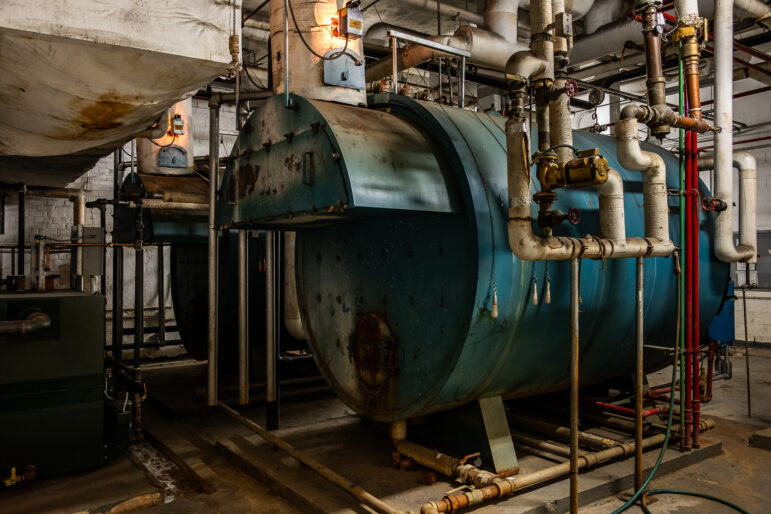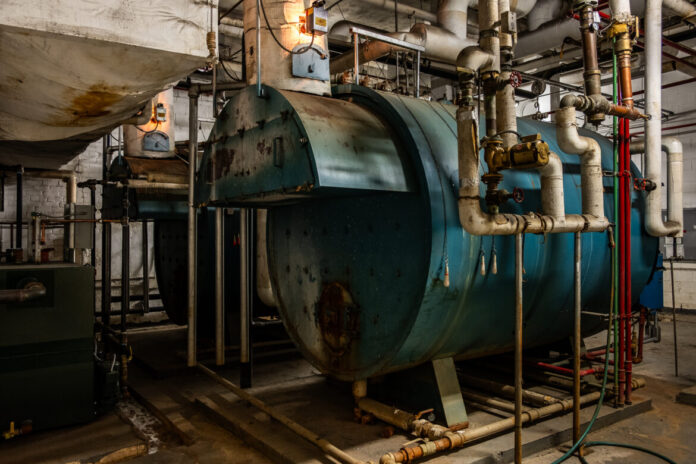A new version of the heavily criticized expired J-51 property tax incentive is back. Advocates argue it will encourage landlords to renovate apartments and will help them afford the upgrades needed to comply with the building emissions law, Local Law 97.

Adi Talwar
The boiler room at a co-op building in Queens. Officials say the new J-51 tax break will help building owners make energy upgrades, like swapping to more efficient heating and cooling systems.
Last week, the New York City Council passed legislation to reduce property taxes for renovations. The move gives landlords an incentive to fix apartments and helps them afford building upgrades in line with the city’s landmark climate emissions mandate, Local Law 97, advocates say.
“This bill will make a big difference for my building. It will save us $50,000 a year,” said Elaine O’Brein, a yoga studio owner and co-op shareholder in Jackson Heights, Queens.
Eligible properties that have invested in building upgrades like O’Brien’s will be able to cut their property taxes for up to 70 percent of the cost of a project, at a little more than 8 percent each year for up to 20 years.
But the last iteration of the program known as “J-51,” a World War II era tax incentive that expired in 2022, came under fire. For decades, many landlords pocketed the incentive while charging tenants market rate rents, despite a requirement that they limit annual rent increases to modest levels determined by the city while benefiting from the tax break.
Still, the program was resurrected in 2023 when Gov. Kathy Hochul signed it back into law. Once the state law went into effect, it needed local approval to get implemented in New York City. Thanks to the bill that was approved by the City Council last week, the revamped version has now been adopted locally.
The new J-51 is more affordability-focused and applies to residential buildings in which half the units rent to households earning up to 80 percent of the area median income (AMI), about $111,840 for a family of three.
It also covers buildings that provide affordable rental and cooperative housing for moderate and middle-income families, as well as co-op and condo buildings with an average value of $45,000 or less per unit.
Around 700,000 homes in the city fit that criteria and will be able to use the abatement, according to the Department of Housing Preservation and Development (HPD), which is in charge of enforcing the program. Of these, 70 percent are rental units and 30 percent are coops and condos.
HPD says those who want to take advantage of the tax break will soon be able to apply on its website as the process for laying out the ground rules for the law unfolds.
The LL97 appeal
Advocates for the resurrection of J-51 hoped the bill would solve two major problems: facilitate renovations in affordable housing that badly needs them, and make it possible for more landlords to afford compliance with Local Law 97 (LL97).
The law, which went into effect this year, requires properties larger than 25,000 square feet to reduce their carbon emissions by becoming more energy efficient through a series of upgrades. That includes sealing windows to keep them from wasting energy or swapping out old heating and cooling systems for more efficient ones.
LL97 plays an important role in the fight against climate change, since over 70 percent of New York’s greenhouse gas emissions come from buildings. The goal is to reduce building pollution by 40 percent by 2030 and 80 percent by 2050.
“We’ve heard so much from co-ops across the city that Local Law 97 requirements are onerous and expensive,” said City Councilmember Pierina Sanchez, the bill’s sponsor and chair of the Committee on Housing and Buildings.
The tax abatement will reach 200,000 co-op and condo families, according to the environmental group Green Co-op Council.
“Programs like J-51 are extremely important to provide support to owners who want to do the right thing so they can meet their climate goals, meet affordability goals, and meet other goals that we have here in the city of New York,” Sanchez added.
In fact, language was added to the legislation to request that HPD gives priority to LL97-related projects, Sanchez says. That means putting them “in front of the line,” when it comes to inspecting and approving the work.
The councilmember said that a specific request was also added to the bill for HPD to prioritize facade improvement and safety work.
“Everybody’s feeling the cost of living squeeze right now. And so people are looking at Local Law 97 and saying, ‘Hey, we really want to do this, it would make our building better. It would help our environment. We just need that help from the city and state so we can do it in a cost effective way,’” said Shay O’Reilly, an organizer with the Green Co-op Council.
Advocates of the bill have high hopes that this new revamped J-51 program will be better than the last. The prior iteration came under heavy criticism after it was revealed that for over two decades, landlords of an estimated 50,000 apartments pocketed the tax break while charging tenants market rents, forcing out residents who couldn’t afford the increases.
The former version of the tax abatement, “primarily serves the interests of landlords and developers, not tenants,” argued Marty Rowland, social justice lecturer at the Henry George School of Social Science, in a 2022 op-ed for City Limits.
Tenant advocates felt HPD should have acted to better enforce the law’s requirements and landlords’ compliance.
“I don’t think there’s been great systems in the past,” HPD Deputy Commissioner Kim Darga testified at a City Council hearing in May, when asked how the city will ensure landlords who get the tax break keep their units rent stabilized, as required.
She said HPD will review annual building registration data, as it does with another tax incentive program, 421a, using information shared by the state’s Division of Housing and Community Renewal, which oversees rent stabilized buildings.
“We have a data sharing agreement for rent stabilized data, and one of the primary uses is for enforcement,” Darga testified.
In an email, HPD spokesperson Natasha Kersey said the department is “committed” to “actively rolling out this revised initiative.”
“The updated program is designed to enhance the quality, affordability, longevity, and protection of New York City’s low-income housing through new extensions and improved enforcement measures, benefiting both tenants by ensuring safe, stable homes and owners by providing support for critical property improvements,” Kersey added.
Those who applaud the resurrection of the program continue to point out that it will also help the city achieve its climate goals.
“This important legislation will make it easier for low-cost condos and coops to pay for energy-efficient improvements and comply with Local Law 97,” Elijah Hutchinson, executive director of the Mayor’s Office of Climate & Environmental Justice, said at a press conference Monday.
To reach the reporter behind this story, contact [email protected]. To reach the editor, contact [email protected]
Want to republish this story? Find City Limits’ reprint policy here.
